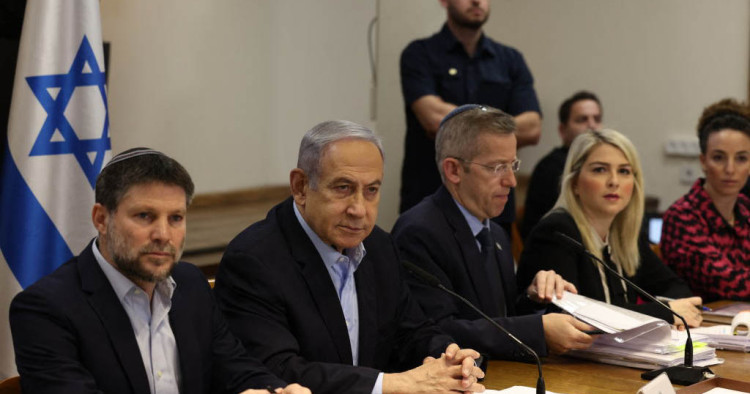Contents:
- Political dynamics inside Israel make an imminent hostage deal problematic
- A pivotal week for Biden’s Middle East diplomacy
- Egypt presents new Gaza truce proposal
- No evidence found: Independent review dismisses allegations against UNRWA
- Pakistan-Iran relations turn from heating up to warming up
Political dynamics inside Israel make an imminent hostage deal problematic
Paul Scham
Non-Resident Scholar

-
Though conditions for an Israel-Hamas hostage and temporary cease-fire deal seem to be aligning, contrary ideological positions within the Israeli cabinet make it unclear whether Prime Minister Benjamin Netanyahu will take the fateful step of crossing far-right Ministers Itamar Ben-Gvir and Bezalel Smotrich.
-
Since all indications are that Netanyahu prizes the maintenance of his government above all else and any alternative coalition is out of the question, it is possible that he would refuse a deal even if it were to be based on Israel’s latest proposal.
Once again, the parties and conditions for an Israel-Hamas hostage and temporary cease-fire deal seem to be aligning, but political conditions on the Israeli side are, as always, unsettled. On Sunday, Hamas told journalists, “There are no substantial disputes with the deal for a cease-fire and the release of hostages that Israel proposed.” Nevertheless, contrary ideological positions within the Israeli cabinet make it unclear whether Prime Minister Benjamin Netanyahu will take the fateful step of crossing far-right Ministers Itamar Ben-Gvir and Bezalel Smotrich, who have consistently threatened to break up the governing coalition if Netanyahu agrees to any deal short of complete victory over Hamas.
Opposition Leader Yair Lapid has already offered to provide the votes in the Knesset to replace those of Ben-Gvir’s and Smotrich’s parties, but that would be little comfort to the prime minister. Lapid, like all opposition leaders, is itching for new elections as soon as possible, and his party’s replacement votes would certainly not extend beyond the hostage deal itself. Since all indications are that Netanyahu prizes the maintenance of his government above all else and any alternative coalition is out of the question, it is possible that he would refuse a deal even if it were to be based on Israel’s latest proposal.
The exact terms of the proposal, to be discussed in Cairo and which is supported by Egypt, the United States, Qatar, and others, have not been made public; but according to The Times of Israel, they include the “humanitarian” release of 33 of the remaining hostages, thought to number 129 (more than 30 of whom are believed to have died), in return for which Israel would “release a far larger number of Palestinian security prisoners, including many with blood on their hands.” Also, Israel has apparently agreed to let Palestinians return to northern Gaza, which it had demanded they leave earlier in the war. News reporting speaks of a 42-day truce, not an end to the war, which has previously been a stumbling block to agreement. Minister Benny Gantz, the leading figure in the war cabinet, who has already called for new elections in the fall, has said the government will have “no right to exist” if it turns down a deal containing these elements. However, his party is not a member of the coalition, so he would not be able to bring it down.
Israeli Foreign Minister Israel Katz told Israel’s Channel 12 that the Israel Defense Forces (IDF) would suspend their long-promised offensive against the southern Gaza city of Rafah if Hamas accepts the proposed deal.
These are the same opposing perspectives that have clashed in the Netanyahu government since before the war began. It is possible that the cabinet could now be brought down by the center or the far right for either refusing or accepting the new deal. Whatever happens will almost certainly disrupt what political equilibrium Israel has retained.
A pivotal week for Biden’s Middle East diplomacy
Brian Katulis
Senior Fellow for US Foreign Policy

-
US Secretary of State Antony Blinken travels to the Middle East for the seventh time since the start of the Israel-Hamas war nearly seven months ago, with hopes for a diplomatic breakthrough rising once again.
-
Much hinges on whether Hamas and Israel can reach agreement on a short-term cease-fire and hostage release deal, which the Biden team hopes can open the door to a longer-term calm and some progress toward possible Saudi-Israeli normalization.
This weekend saw a flurry of diplomacy shift into higher gear on multiple fronts, all aimed at trying once again to achieve a temporary cease-fire and hostage release in the Israel-Hamas war in Gaza. US Secretary of State Antony Blinken is on his seventh trip to the Middle East since the start of the war nearly seven months ago, with hopes for a diplomatic breakthrough rising once again.
Blinken, speaking in Saudi Arabia, spotlighted what he called Israel’s “extraordinarily generous” proposal to Hamas in cease-fire and hostage release talks. For weeks, US officials and others have accused Hamas of obstruction for failing to accept the terms of proposals put forward in complicated negotiations brokered by Egypt and Qatar. Israel has reportedly softened its demands in those talks, lowering the number of hostages it hopes to see released by Hamas to 33 people, a group that would comprise the elderly, children, the wounded, and women, including female soldiers.
At the same time as Blinken was heading to the region, President Joe Biden and Israeli Prime Minister Benjamin Netanyahu spoke on the phone. In their conversation, Biden once more raised concerns about Israeli plans to conduct a military operation in Rafah without a clear plan for civilian protection, and he called for increasing humanitarian assistance to Gaza. However, Biden also reiterated “ironclad” US support for Israel’s self-defense against threats, including those coming from Iran.
While the immediate action is focused on crisis diplomacy, part of Blinken’s visit to Saudi Arabia also dealt with the pathway for unlocking a series of US-Saudi deals on defense, civilian nuclear cooperation, and technology, among other issues. This package is part of the pre-Oct. 7 agenda the Biden administration had for advancing a possible normalization deal between Saudi Arabia and Israel. Such a deal is very unlikely to happen as long as war continues to rage between Israel and Hamas in Gaza. But regional tensions from the threats posed by Iran and its network of partners across the Middle East could similarly scuttle progress.
Meanwhile, inside the United States, a wave of protests organized mostly at elite universities in urban areas, has captured the attention of the media. Competing camps have voiced opposing views, some in favor of Palestinians and others in favor of Israel. And although these protests generate a lot of rancor, it remains unclear how much such events will matter in US politics, even in a presidential election year. Other issues like immigration, abortion, and the economy presumably rank higher among ordinary US voters, and many things can change in the Middle East in the coming six months before Americans cast their ballots.
The reality remains that progress in the Middle East will more likely be achieved through quiet diplomacy by the United States and other key actors. The center of gravity in resolving today’s conflicts in the Middle East lies in the region itself — and depends much more immediately on the decisions made by leaders in the tunnels of Gaza or the hallways of power in Israel, Saudi Arabia, Egypt, and Jordan than on whatever policy consequences might come from the heated rhetoric and political divisions in America.
The Biden administration has stepped up its engagement in the Middle East since the start of the Israel-Hamas war last year, but its record of crisis diplomacy and expanded military support and cooperation remains quite mixed, as analyzed in this recent report card and report. Still, this week could prove to be an important turning point depending on the decisions made by leaders and people in the region and supported by the diplomatic efforts of US officials like Secretary of State Blinken.
Follow: @Katulis
Egypt presents new Gaza truce proposal
Mirette F. Mabrouk
Senior Fellow and Founding Director of the Egypt program

-
Egypt has advanced a new cease-fire proposal that reportedly entails Israel suspending all preparations for a Rafah invasion, the release of all Israeli hostages held by Hamas and hundreds of Palestinian prisoners held in Israeli prisons, and a year-long cease-fire, during which time the US, Egypt, Jordan, and the Palestinian Authority would make a joint declaration on the formation of a Palestinian state.
-
After holding talks with Israelis in Tel Aviv on Friday, Egyptian officials are currently meeting with a Hamas delegation in Cairo to discuss the latest proposal.
There have been proposals for a cease-fire between Israel and Hamas before, and they have all resulted in disappointment. The cost of every refusal has continued to grow, while the already dire humanitarian situation on the ground in Gaza has become catastrophic. Last Friday, an Egyptian delegation was in Tel Aviv to discuss the latest proposal, which is an Egyptian effort. The Qataris, who have been extensively involved in negotiations from the outset, have apparently found it difficult to weather increasing Israeli accusations, particularly from Prime Minister Benyamin Netanyahu, who has reportedly called their role in the talks “problematic.” The spokesperson for Qatar’s foreign ministry, Majed al-Ansari, had said that he was “appalled” by Netanyahu’s comments. The Gulf state has also been appalled by Israeli accusations that it funded Hamas, despite documentation that financial dealings with Hamas were, in fact, approved by Netanyahu himself.
There has been no turning back for Egypt, however. Apart from its traditional role as a negotiator in this particular conflict, the unfolding humanitarian and security nightmare on its borders lends a deep urgency to Egypt’s involvement. According to reporting from Ynet News last Friday, Israel hoped that the Egyptian proposal would lead to a breakthrough and that it “would give both sides to the conflict what they consider their primary goal, adding that the concern for the situation in Rafah prompted Egypt to try to postpone any IDF [Israel Defense Forces] operation there.” Ynet went on to describe the three main points of the proposal: Israel suspending all preparations for a Rafah invasion, the release of all Israeli hostages held by Hamas “in pulses, 10 days apart,” in exchange for the release of hundreds of Palestinian prisoners held in Israeli prisons and a year-long cease-fire with both sides’ commitment, during which time a joint declaration by the United States, Egypt, Jordan, and the Palestinian Authority would be made on the formation of a Palestinian state.
While the conflict has strained relations between Egypt and Israel, the impending full-scale assault on Rafah and the consequent humanitarian disaster is a potential last straw. Such an assault would produce two outcomes that are anathema to Egypt: the potential flooding of Palestinian refugees into the country and Israel’s entry into the Philadelphi Corridor, a narrow buffer zone between Gaza and Egypt. The first outcome has been consistently rejected by Egypt since the start of the conflict; apart from the potential security nightmare of armed militants crossing over with ordinary Palestinians fleeing conflict, Egypt refuses to be party to another Nakba, or forced mass displacement. The second outcome violates the 1979 peace treaty between Egypt and Israel.
A Hamas delegation is currently in Cairo to discuss the latest proposal. Even if they do agree to it, there is a strong possibility that Netanyahu and far-right cabinet members like Itamar Ben-Gvir and Bezalel Smotrich will not, despite the conflict’s rapidly rising regional cost.
Follow: @mmabrouk
No evidence found: Independent review dismisses allegations against UNRWA
Carol Daniel Kasbari
Non-Resident Scholar

-
An independent review led by former French Foreign Minister Catherine Colonna found no evidence to support allegations that UNRWA employees were linked to Hamas, despite Israel's claims that led to significant international funding suspensions.
-
The review emphasized UNRWA’s strict neutrality measures and essential role in providing humanitarian aid to Palestinian refugees, recommending further enhancement of its governance and communication strategies to ensure continued support without political interference.
An independent review led by former French Foreign Minister Catherine Colonna found no evidence to support Israel’s allegations that employees of the United Nations Relief and Works Agency for Palestine Refugees in the Near East (UNRWA) were linked to Hamas or other terrorist activities. The review, which examined UNRWA’s operations and policies following Israel’s claims, concludes that the allegations were unsupported by concrete evidence provided by Israeli authorities.
The Colonna report highlights UNRWA’s robust procedures for maintaining neutrality, emphasizing the agency’s commitment to preventing political biases in its operations. This includes sharing staff lists with host countries; Israel notably had access to these but, until this past January, had not raised concerns about specific individuals since 2011. Despite this, Israel’s claims in early 2024 led to significant funding suspensions from major donor countries, severely impacting UNRWA’s ability to operate, especially in Gaza.
The report also underscores UNRWA’s vital role in providing essential services and humanitarian aid to Palestinian refugees, describing the agency as “irreplaceable and indispensable” for the region’s stability. Recommendations from the review include enhancing UNRWA’s governance and communication strategies and continuing to strengthen its neutrality assurance measures. In addition, it proposes enhanced training and stricter employee screening processes.
This review is part of a broader investigation into UNRWA by the United Nations, with another report pending from the UN Office of Internal Oversight Services regarding specific allegations of UNRWA employees’ involvement in the Oct. 7 attack on Israel. After these accusations were made, UNRWA terminated the contracts of several employees linked to the incident. The outcomes of this ongoing investigation are yet to be disclosed.
While some international donors, like Germany, have resumed funding following the review’s findings, others, including the United States, have withheld financial support until at least March 2025, as they wait on further reviews to be completed. Israel has dismissed the Colonna report’s conclusions, continuing to assert concerns over Hamas’ influence within UNRWA without substantiating these claims. The review’s findings have prompted a broader discussion on the necessity of continued international support for UNRWA to fulfill its crucial humanitarian role without political interference.Top of Form
Follow: @CarolDkas
Pakistan-Iran relations turn from heating up to warming up
Marvin G. Weinbaum
Director, Afghanistan and Pakistan Studies

-
Just three months after Pakistan and Iran exchanged tit-for-tat missile strikes, bilateral relations are now in a much better place, with Iranian President Ebrahim Raisi’s visit highlighting an evolving strategic and symbolic convergence between the two countries.
-
To better secure its eastern flank and win backing for its efforts to project influence and power in the Arab Middle East, Iran has reached out to repair ties with Pakistan and Afghanistan, but there are real limits to how far the two countries can go in aligning with Iran’s policies.
Only three months ago, in mid-January, many feared that major hostilities were about to erupt between Pakistan and Iran. In response to terrorist attacks carried out by the Pakistan-based Jaish al-Adl, a sectarian-nationalist insurgent group, Iran launched a barrage of missiles and drones into Pakistan’s neighboring province of Balochistan. Pakistan condemned the attack and, two days later, conducted airstrikes against its own separatist ethno-nationalist militants operating from Iran’s Sistan-Baluchistan Province. Although both Tehran and Islamabad immediately sought to defuse a crisis they viewed as contrary to their regional interests, bad feelings nevertheless lingered between the two countries.
Bilateral relations in late April could not look more different. Last week, Iranian President Ebrahim Raisi received an especially warm reception during a three-day visit to Pakistan. His meetings with Pakistan’s Prime Minister Shehbaz Sharif, President Asif Zardari, Army chief Gen. Asim Munir, and top parliamentary leaders, among others, culminated in a 28-point joint statement intended to serve as the framework for a broadly expanded relationship. The visit underscored Iran and Pakistan’s commitment to enhancing regional integration through economic, energy, and security cooperation. Economically, the two countries have pledged to increase trade from a minuscule $2 billion to $10 billion annually. Energy-wise, they have recommitted to completing their long-delayed natural gas pipeline project. On the security front, Islamabad and Tehran have expressed a mutual desire to combat cross-border terrorism and foster prosperity in their respective border regions. President Raisi indicated to Gen. Munir Iran’s interest in fostering cooperation with Pakistan’s Army. Overall, Raisi’s visit highlighted an evolving strategic and symbolic convergence between the two countries, which underscores how Pakistan’s increasing foreign policy emphasis on regional issues and priorities aligns with many of Iran’s own strategic objectives.
What then accounts for the rather abrupt change in relations? Above all, Iran’s rapprochement with Pakistan reflects its rapidly deepening strategic engagement in the Arab Middle East, now highlighted by the conflict in Gaza. To better secure its eastern flank and win backing for its efforts to project influence and power, Iran has reached out to repair ties with Pakistan as well as Afghanistan. Pakistan obligingly took the occasion of the Raisi visit to shift its Gaza policy from one of low-key support for the Palestinian cause to a full-throated declaration of solidarity with Muslim countries on the issue. Similarly in Afghanistan, a previous reluctance by the Taliban government to involve itself in international affairs has recently changed to a willingness to align with Iran on the Gaza issue. Despite Afghanistan’s long-standing differences with Iran over water rights, drug trafficking, and treatment of Afghan refugees, Tehran has warmed to the Kabul government. The two countries are working to enhance ties, emphasizing trade and security cooperation to ensure that their territories are not used as a launch pad for hostile activities against each other. With an exchange of ambassadors, Iran has all but formally accorded to the Kabul regime its long-sought diplomatic recognition.
Yet there are also real limits to how far Pakistan and Afghanistan can go in aligning with Iranian policies. The Taliban regime can ill afford to alienate the United States, which is by far the largest contributor of humanitarian assistance to the country and, if only indirectly, plays a major role in helping to stabilize its economy. By hosting the Iranian president, Pakistan has sought to demonstrate that it has less fear of foreign sanctions and a greater desire to prioritize regional goals and core national interests. But Pakistan also seems reluctant to stray too far from what has for some time been a declared policy of avoiding bloc politics. Following the Raisi visit, Pakistan’s Foreign Office released a statement meant to assure the US that its improved relations with Iran will not undermine their ties. Over time, Pakistan’s foreign policy has shown itself remarkedly adept at balancing relations with mutually antagonistic states. Those skills are once again being put to the test.
Research assistant Naad-e-Ali Sulehria contributed to this piece.
Follow: @mgweinbaum
Photo by RONEN ZVULUN/POOL/AFP via Getty Images
The Middle East Institute (MEI) is an independent, non-partisan, non-for-profit, educational organization. It does not engage in advocacy and its scholars’ opinions are their own. MEI welcomes financial donations, but retains sole editorial control over its work and its publications reflect only the authors’ views. For a listing of MEI donors, please click here.













